2024 BMW X2 First Drive Review: A niche within a niche, but an interesting one
CASCAIS, Portugal — BMW’s even-numbered X-series line of slope-back crossovers is proof that not every vehicle has to make perfect sense. The German brand basically invented the genre when it significantly reduced the usability of its otherwise luxurious and practical X5 by redesigning its roofline to reduce its capacity to hold humans and cargo while simultaneously making it more expensive. The X6, back in 2008 or today, doesn’t make sense. Except it sort of does once you realize and accept that it was all done in the name of style. Either way, the world was introduced to a new category of vehicles that BMW termed the Sports Activity Coupe.
The next-generation 2024 BMW X2 follows the same path as the X4 and the aforementioned X6. That makes it a departure from the first-generation X2, which was more like a big hatchback with some avant garde styling cues. Like its predecessor, though, the new X2 is still based atop the guts of the most recent X1 that we generally like. In the same way that the latest X1 is so thoroughly improved over its predecessor, the X2 is a vastly better vehicle than the old X2, with more room inside, better in-car technology, improved dynamics and a more refined powertrain with the addition of a quick-shifting dual-clutch gearbox.
Perhaps most importantly, considering its mission, it also looks more aggressive and, though the original X2 certainly had a unique look, will more clearly stand out in a crowd. The angular twin grilles are large, but not comically so. While their shape doesn’t look like any naturally occurring kidney we’ve ever laid eyes on, BMW still calls them such. And if you’re going to buy a current BMW with over-flared nostrils, adding the optional illumination surround seems like a reasonable choice. From that brachycephalic face, the rest of the X2 flows well with a roofline that’s fashionably low before trailing back at a quick angle directly aft of the box-shaped cabin. Mildly beefed-up flares around the wheel arches provide some visual muscle.
The 2024 BMW X2 is quite a bit larger than the model it replaces. It’s 2.5 inches taller, and close to 8(!) inches longer on a wheelbase and track that are pushed out a little less than an inch each. That overall length is especially noteworthy as it’s 2.6 inches longer than even the X1 that’s designed to fulfill the more practical side of the small-SUV ledger. All in the name of style, of course.
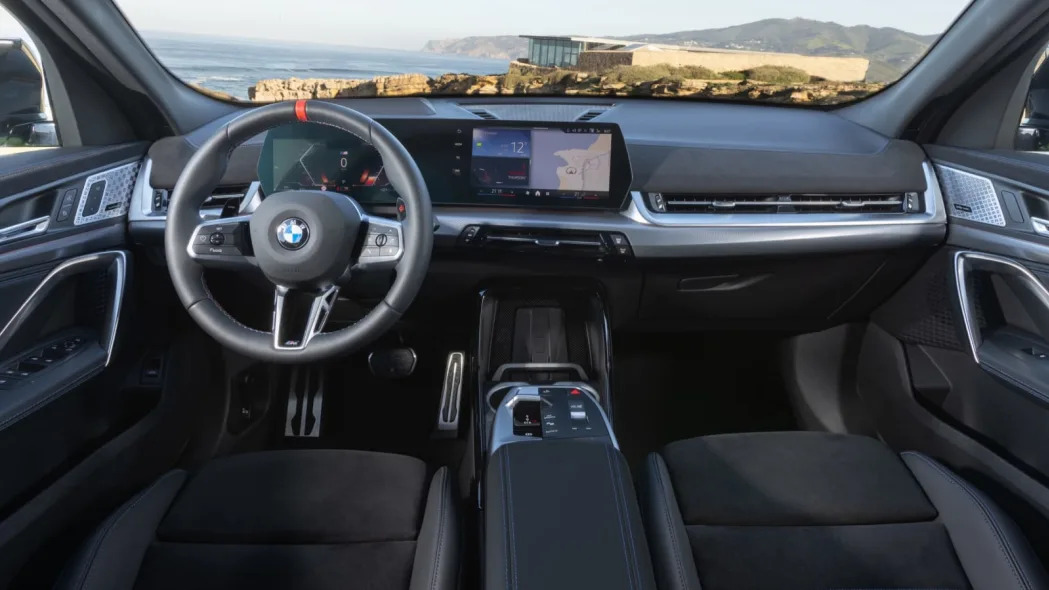
It comes as no surprise that interior spaciousness and cargo capacity are also better than before. BMW hasn’t listed full interior specs just yet, but notes “noticeable increases in shoulder and elbow room.” Rear-seat legroom is said to be up by a full inch, and indeed, none of my limbs were too pinched while folding myself into the back and getting comfy behind a virtual 6-foot driver. It’s not entirely cave-like in the back, either, though an X1 will be more friendly for family duty. There’s 25.3 cubic feet behind the 40/20/40-split folding rear seat, or as much as 51.7 cubic feet with it folded. That’s up by more than 3 and 4 cubic feet, respectively. That total is also virtually identical to the X1’s cargo capacity behind its back seat, but we’ll need to test it to see if that comparison shakes out in real life.
The rest of the interior appointments and technology mimic those of the X1 we reviewed a year ago. There’s enough matte-finish brightwork inside the X2 M25i we tested to disrupt what would otherwise be a monotony of black plastic, Alcantara, animal-free faux leather and textiles. Surrounding the driver is BMW’s big, curved digital panel that stretches along the dash to encapsulate the touchscreen infotainment with crisp graphics, quick responses and a lot less menu digging. That’s important, since BMW’s old knob-based iDrive setup is gone in favor of a touch-only-based iDrive 9 system initially implemented in the X1 (note that the BMW i5 and presumably future upper-end BMWs keep the knob as a redundant luxury). Like other recent BMWs, the gear selector is now operated via a small toggle that looks strange at first but is actually refreshingly simple to operate.
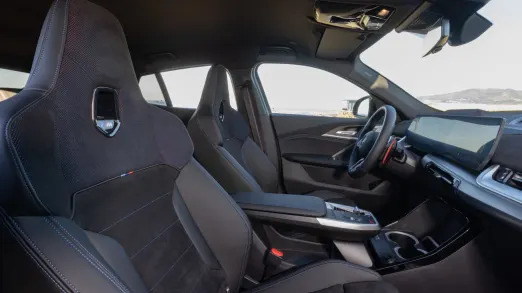
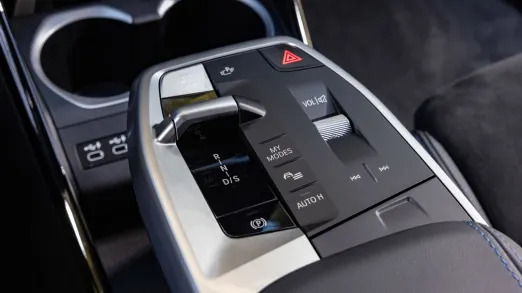
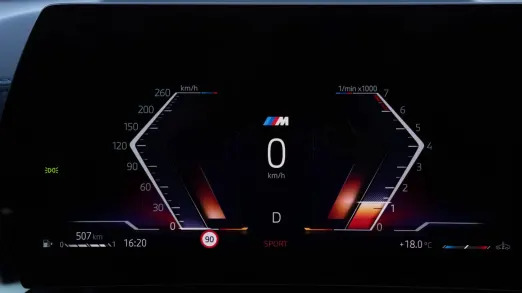
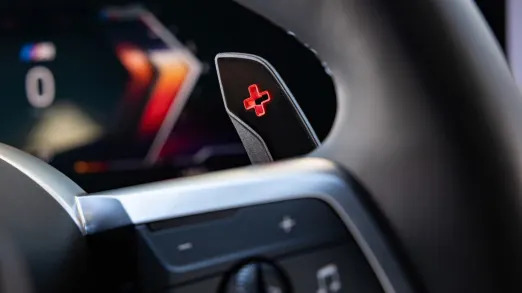
All the models BMW made available for us to drive had a solid black interior with seats clothed in cool patterns of the marque’s traditional red and blue M motif shining discretely through. BMW’s online configurator shows there are other shades offered, including one in dual-tone grayish earth tones, a light “Oyster” color, deep Mocha brown and a sporty-looking Red and Black motif. Note that the Frozen Tampa Bay green you see in our images is not (currently) listed in the automaker’s U.S.-market color palette. Shame.
As we dissect what it’s like to drive the BMW X2 M35i, which is the only spec we’ve tested, it’s key to recognize this car sits in a niche within a niche within a popular segment. The X2 in general, made up of the $42,995 (including destination) xDrive28i with 241 horsepower and the $52,395 X2 M35i with 312 hp, is intended as a stylish alternative to the more mainstream X1. There’s niche one. Both share the same chassis and interior layout, but the X2 is intended as the squished-down sporty option, and within that slice, the M35i is the one that is actually expected to, well, be the sporty option. So then, niche two.
With that out of the way, yes, the 2024 X2 M35i is indeed tuned on the aggressive side. Its 2.0-liter turbocharged engine spins out 312 horsepower between 5,750 and 6,500 rpm, and its torque peak of 295 pound-feet plateaus between 2,000 and 4,500 rpm. BMW says the 3,840-pound X2 M35i can hit 60 in 5.2 seconds while the X2 xDrive28i adds one full second to the timed run. Regardless of which engine is chosen, all four wheels are driven.
In the real world, there’s a brief lag right off idle before the power comes on, but it feels nice and meaty in the middle of its rev range. The seven-speed dual-clutch gearbox has a built-in mechanical limited slip differential and shifts quickly, whether responding to pulls of the wheel-mounted paddles or acting on its own. There’s a Sport mode for the transmission, and a pull of the left paddle can engage a Boost mode that puts all functions into their most aggressive settings for a period of 10 seconds — perfect to execute quick passing maneuvers.
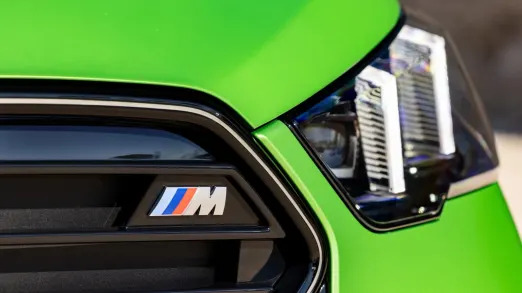
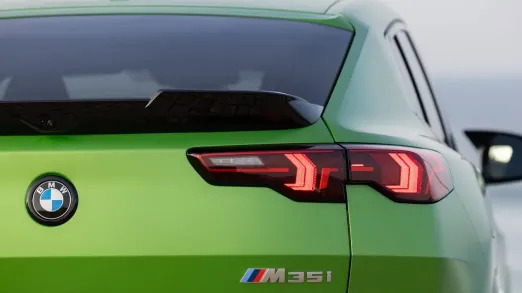
We wouldn’t call its suspension tuning uncomfortable, per se, but it’s certainly stiff and lies awfully close to that realm. The shocks are electronically controlled by a digital brain, but most of what it does happens without driver intervention and depends on the selected drive mode. As standard, those include Personal Mode, a Sport Mode that firms up the steering and increases the “engine” sounds that are pumped through the speakers, and Efficient Mode, which relaxes the engine and ekes out additional efficiency wherever possible. Customers who opt to sign up for BMW Digital Premium also get Expressive Mode, Relax Mode and Digital Art Mode, which allow for greater personalization of vehicle systems that goes beyond mechanical/drive elements.
While the front strut and rear three-link suspension designs look similar to the old X1 and X2, they are completely redesigned and have recalculated geometry to be more rigid, thereby improving overall vehicle responsiveness. Having recently driven a slightly older BMW in Europe that’s similarly based on a front-drive chassis, I’m happy to report that BMW’s latest X2 feels like it’s picked up greater overall rigidity, which helps the speed-sensitive steering feel solid and direct. Similarly direct are the brakes, with an M-compound package that brings four-piston, fixed-calipers on 15.2-inch drilled discs at the front and single-piston, floating-calipers on 13.0-inch discs at the rear. Initial bite is extremely strong, so much so we had to adjust our braking foot throughout the first half of the day to account for their forcefulness. The 20-inch alloy wheels wear Pirelli P Zero tires in 245/40 size. And yes, those small sidewalls are one reason for the sometimes-harsh ride over rough pavement.
On the positive side, the extended wheelbase of the new X2 means it’s less hypersensitive front-to-rear over bumps. The greater width offers strong cornering grip, and the stiffened structure means it settles more quickly, helped by new frequency-selective dampers with an additional sleeve designed to reduce unwanted suspension lift, and rebound valving that helps smooth small bumps. The test car’s optional sport seats are well bolstered, but still fit my husky-sized frame comfortably, and their grippy surface held me in place when pushing the X2 through the twisty Portuguese roads outside Lisbon.
BMW’s Driving Assistant Professional is optional on the X2 and includes Steering Assistant as well as Distance Control, which keeps the vehicle in its lane and a safe distance from the vehicle ahead. Traffic Jam Assistant allows hands-free driving at speeds up to 40 mph on some highways while an interior camera makes sure the driver is still paying attention. Forward Collision Mitigation, Collision Warning and Active Blind Spot Detection are standard.
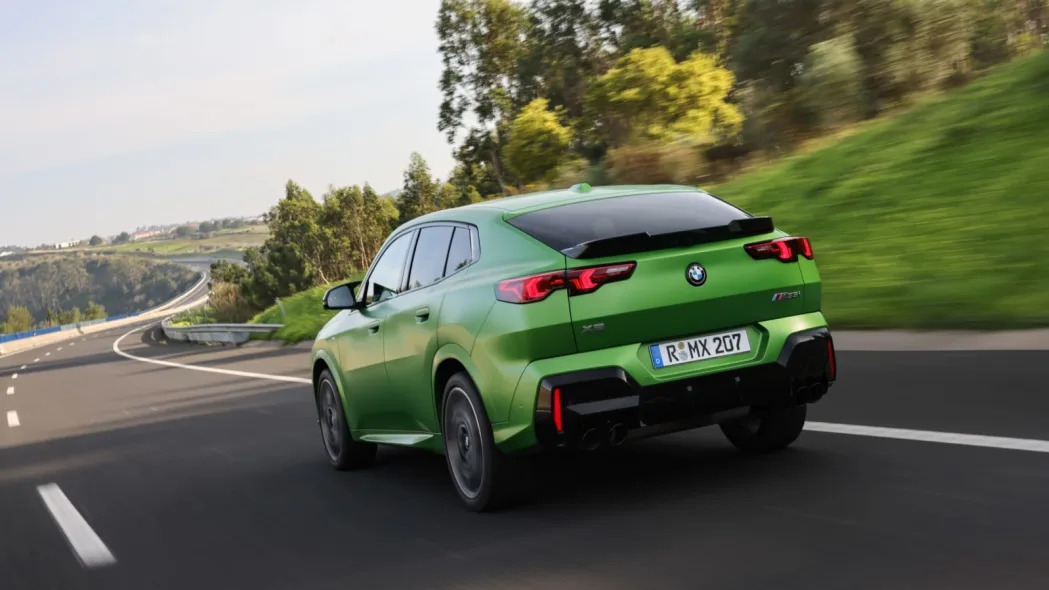
When looked at through the narrow niche-within-a-niche lens, the X2 M35i makes at least some amount of sense. Like the Mini Countryman that we also recently tested — and which is also based on the same chassis as the X1 and X2, further narrowing the scope of each vehicle’s target audience — this hi-po X2 is tuned quite aggressively. It’s arguably too much for buyers who live in areas with bad asphalt or without access to remote, twisty roads with suitably high speed limits. But it’s clearly not targeted at those buyers. That’s what the X1 (even if BMW has already announced a similarly aggressive X1 M35i) is supposed to be for.
The 2024 BMW X2 is superior in every meaningful way to the X2 it replaces. It’s still not for everyone, particularly in M35i trim, but considering how much carving BMW has done to the subcompact SUV segment, it’s a worthwhile addition to the lineup for buyers willing to give up some practicality in the name of style.
